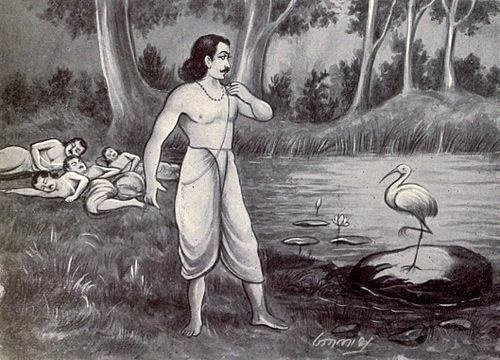
The question of Yaksha and answer thereto by Yudhisthira are as follows:
यक्ष उवाच।
का दिक्किमुदकंपार्थ किमन्नं किंच वै विषम्।
श्राद्धस् कालमाख्याहि ततः पिब हरस्व च ॥
The Yaksha asked, 'What defines the path? What has been referred to as water? What is considered food? And what is seen as poison? Also, tell us the right time for a Shraddha so you can drink and take as much as you like!'
युधिष्ठिर उवाच।
सन्तो दिग्जलमाकाशं गौरन्नं ब्राह्मणं विषम्।
श्राद्धस्य ब्राह्मणः कालः कथं वा यक्ष मन्यसे ॥
Yudhishthira answered, 'The good define the path. Space is likened to water. The cow represents food. A request is poison. And a Brahmana signifies the proper time for a Shraddha. I wonder how this all sits with you, oh Yaksha?'
—
Mahabharata was composed by Sage Vyasa to spread the importance of Dharma to the World.
If we carefully study this particular episode, we can realise that Dharma, who in the form of Yaksha, tested the Pandavas. Even Arjuna, who had all types of DIVINE weapons, could not touch the Dharma, before falling dead. It was only the righteousness and wisdom of Yudhisthira that was able to satisfy Dharma.
Please note that in the end of this episode, Dharma was eulogised as the object of contemplation of all the worlds.
इत्युक्त्वान्तऽर्दधे धर्मो भगबाँल्लोकभावनः। समेताः पाण्डवाश्चैव सुखसुप्ता मनस्विनः ॥
After speaking these words, the revered Dharma (Lord of justice), who is the object of contemplation of all the worlds, disappeared; and the noble Pandavas, having enjoyed a peaceful sleep, came together.
—
According to my understanding, this episode was the original composition of Sage Vyasa, unlike many episodes, which were added or expanded in subsequent generations, as importance of Dharma was extolled here.
All the spiritual concepts of Sanatana Dharma were adopted in Brāhmaṇas, Upanishads, Ramayana, Mahabharata, etc, from Rig Veda only.
1) In Rig Veda, we can find many terms used in esoteric sense.
The word Salilam, indicating water in subsequent literature, was first used in Rig Veda. Udakam, Jalam, etc, also indicates water.
For example: Rig Veda 10.129.3 says - tama āsīt tamasā gūḻham agre 'praketaṃ salilaṃ sarvam ā idam - here was darkness covered by darkness in the beginning, all this (world) was undistinguishable water.
2) Interestingly, the same word Salilam was used in the same sense even in the Śatapatha Brāhmaṇa also.
āpo ha vā idamagre salilamevāsa - Verily, in the beginning this (universe) was water, nothing but a sea of water.
3) In Ramayana, the same concept was repeated.
सर्वम् सलिलम् एव आसीत् पृथिवी यत्र निर्मिता |
ततः समभवद् ब्रह्मा स्वयम्भूर् दैवतैः सह || २-११०-३All was water only in the beginning" from which element the earth was formed. After that, the self-existent Brahma with all the gods came into existence."
The interesting thing to be noted that all the texts say that There was only water in the beginning.
However, we all know that in order to Water exist, it must have support like earth/container, but here it was mentioned that only water existed in the beginning. How can that be possible?
It is possible only if we agree that the Rig Vedic rishis used the word Salilam, Udakam, Jalam, etc, to indicate WATER as well as SPACE.
In the subsequent generations, however, the words Salilam, Udakam, Jalam, etc, might have been used to indicate only water.
If Salilam indicates SPACE also, everything fit into the pattern.
The Rig Vedic rishis were saying that in the beginning only SPACE existed, from which everything else came into existence.
The same concept got reflected in Sage Vyasa’s original composition of Mahabharata as the question of Yaksha - What is water - किमुदकं? to which Yudhisthira replied Water is SPACE - जलमाकाशं, to indicate the original idea of using the word Salilam interchangeably as Water and SPACE.
No comments:
Post a Comment